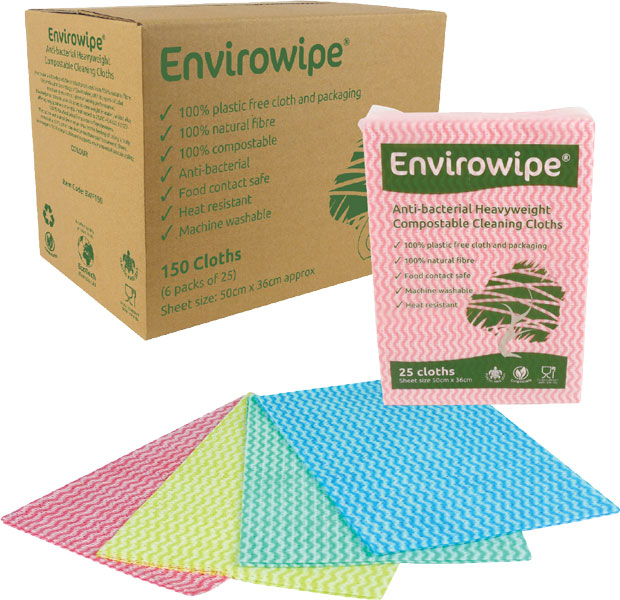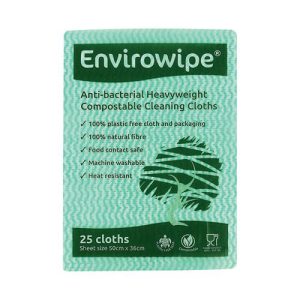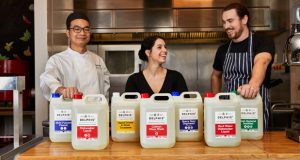
 Ashleigh Brownhill, Commercial Director, EcoTech (Europe) Ltd
Ashleigh Brownhill, Commercial Director, EcoTech (Europe) Ltd
Sustainability has in recent times become a vital criterion in product selection across a broad spectrum of industries.
Indeed, the sustainability credentials of a potential supplier are often now a pivotal factor in the decision as to whether or not that supplier will be chosen.
In cleaning and hygiene applications, as elsewhere, customers and end users are seeking to cut their carbon footprint and leave a greener legacy.
This has proved a significant challenge in a sector with traditionally high purchase levels of single-use consumable products which are disposed of immediately after use, such as cloths and wipes.
Manufacturers of cleaning products worldwide have sought to respond to this requirement through the development of ‘sustainable’ products – whether this refers to the use of recycled or sustainable materials, end-of-life recyclability, compostability, biodegradability or any combination of the above.
Many products now claim at least an element of sustainability. And research is ongoing to bring further sustainability attributes to cleaning consumables – particularly in the light of imminent UK Government legislation which is set to ban the sales and use of wet wipes containing plastics in a bid to tackle water pollution.
Plastic-free, completely compostable wipes are already on offer and our own experience is that many customers and end users are already seeking to adopt the use of these ahead of the enactment of this legislation.
A further consideration around sustainability relates to the distance which products must travel from their point of manufacture to the eventual location where they will be used.
This is a question being asked more and more frequently by distributors and their customers as they seek locally sourced and manufactured products and this is a challenge which all suppliers would be well advised to seek to address sooner rather than later.
However, one area which has not to date always received the same attention as the make-up of the product itself is the materials used to contain and protect the product en route from the manufacturer to wholesaler, and then on to the end user.
Bags, wrapping, containers, boxes and tapes are all widely used to keep the product safe, clean and hygienic.
However, the types of materials used for this task have in many cases remained the same for many years and have seldom kept pace with the drive for sustainability attached to the cleaning products themselves.
Tapes, bags and wrapping are typically all still plastic-based meaning there is no opportunity to recycle or compost and are not themselves generally made from recycled materials.
And when it comes to the protection of products which are supplied already impregnated with cleaning fluid, a container made completely from plastic has often been the only option to keep them moist and clean while not being susceptible to damage emanating from moisture coming into contact with the container.
There has, of course, been progress around the use of recycled materials to make cardboard boxes and the onward recycling of these boxes.
However, only in recent times have more sustainable alternatives to other packaging materials become available.
It is an area where ongoing commitment to research & development by leading manufacturers is now allowing wholesalers and end users to claim greater environmental credentials in their activities.
Wet products can now be supplied in cardboard containers lined with plastic, rather than fully plastic containers, allowing for the required moisture retention but significantly reducing the quantity of plastic used. And some plastics used for this purpose are now recycled too.
Meanwhile, some brands of dry wipes – not just the product itself, but the box, tapes and wrapping – are, for the first time, all completely compostable.
 Instead of plastic-based wraps such as cellophane, the products are now supplied in wraps made from potato starch, a completely natural product which offers all the same attributes when it comes to product protection and containment but with none of the environmental drawbacks.
Instead of plastic-based wraps such as cellophane, the products are now supplied in wraps made from potato starch, a completely natural product which offers all the same attributes when it comes to product protection and containment but with none of the environmental drawbacks.
The area of packaging has now become, for many, one where more probing questions are being asked by those with responsibility for specification and purchasing to ensure alignment with their own sustainability goals.
And as legislation and regulation continue to tighten, buyers and specifiers will need to continue to take a truly holistic view when it comes to the selection of ‘sustainable’ cleaning solutions.




